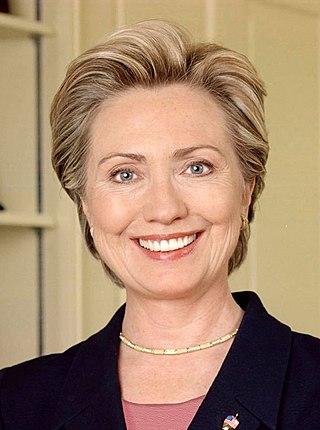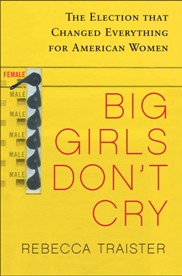
EMILYs List is an American political action committee (PAC) that aims to help elect Democratic female candidates in favor of abortion rights to office. It was founded by Ellen Malcolm in 1985. The group's name is an acronym for "Early Money Is Like Yeast". Malcolm commented that "it makes the dough rise". The saying refers to a convention of political fundraising: receiving many donations early in a race helps attract subsequent donors. EMILYs List bundles contributions to the campaigns of Democratic women in favor of abortion rights running in targeted races.
Slut is an English-language term for a person, usually a woman, who is sexually promiscuous or considered to have loose sexual morals. It is predominately used as an insult, sexual slur or offensive term of disparagement. It originally meant "a dirty, slovenly woman", and is rarely used to refer to men, generally requiring clarification by use of the terms male slut or man whore.
Judicial Watch (JW) is a 501(c)(3) nonprofit American conservative activist group that files Freedom of Information Act (FOIA) lawsuits to investigate claimed misconduct by government officials. Founded in 1994, Judicial Watch has primarily targeted Democrats, in particular the administrations of Bill Clinton and Barack Obama, as well as Hillary Clinton's role in them. It was founded by attorney Larry Klayman, and has been led by Tom Fitton since 2003.

Hillary Diane Rodham Clinton is an American politician and diplomat. She was the 67th United States secretary of state in the administration of Barack Obama from 2009 to 2013, a U.S. senator representing New York from 2001 to 2009, and the first lady of the United States as the wife of Bill Clinton from 1993 to 2001. A member of the Democratic Party, she was the party's nominee in the 2016 presidential election, becoming the first woman to win a presidential nomination by a major U.S. political party and the first woman to win the popular vote for U.S. president. She is to date the only first lady of the United States to have run for elected office.

The 2008 presidential campaign of Hillary Rodham Clinton, then junior United States senator from New York, was announced on her website on January 20, 2007. Hillary Clinton was previously the First Lady of the United States and First Lady of Arkansas prior to her election as U.S. Senator from New York. She is also the wife of former President Bill Clinton. Clinton was the source of much media speculation since having expressed interest in being a candidate in the 2008 presidential election since at least October 2002.

The 2008 Florida Democratic presidential primary took place on January 29, 2008. Originally, the state had 185 delegates up for grabs that were to be awarded in the following way: 121 delegates were to be awarded based on the winner in each of Florida's 25 congressional districts while an additional 64 delegates were to be awarded to the statewide winner. Twenty-five unpledged delegates, known as superdelegates, were initially able to cast their votes at the Democratic National Convention.

The 2008 Pennsylvania Democratic presidential primary was held on April 22 by the Pennsylvania Department of State in which voters chose their preference for the Democratic Party's candidate for the 2008 United States presidential election. Voters also chose the Pennsylvania Democratic Party's candidates for various state and local offices. The selected candidates were placed on the ballot of the 2008 general election on November 4. The Democratic primary was part of a general primary that also included the 2008 Pennsylvania Republican presidential primary.

U.S. Senator Hillary Clinton of New York unsuccessfully sought the Democratic Party's 2008 nomination for president of the United States. She won many primaries, although she ultimately lost the nomination to Barack Obama.
https://www.kidspickthepresident.com/

The 2008 United States presidential election in Pennsylvania was part of the 2008 United States presidential election, which took place on November 4, 2008, throughout all 50 states and the District of Columbia. Voters chose 21 representatives, or electors to the Electoral College, who voted for president and vice president.
Women's work is a field of labour assumed to be solely the realm of women and associated with specific stereotypical jobs considered as uniquely feminine or domestic duties throughout history. It is most commonly used in reference to the unpaid labor typically performed by that of a mother or wife to upkeep the home and children.

The 2016 presidential campaign of Hillary Clinton was announced in a YouTube video on April 12, 2015. Clinton was the 67th United States Secretary of State and served during the first term of the Obama administration, from 2009 to 2013. She was previously a United States Senator from New York from 2001 to 2009, and is the wife of former President Bill Clinton. Hillary Clinton served as First Lady of the United States from 1993 to 2001.

Big Girls Don't Cry: The Election that Changed Everything for American Women is a 2010 non-fiction book written by the American journalist Rebecca Traister and published by Free Press. The book focuses on women's contributions to and experiences of the 2008 United States presidential election. Traister places particular focus on four main political figures—Hillary Clinton, Sarah Palin, Michelle Obama, and Elizabeth Edwards—as well as women in the media, including the journalists Katie Couric and Rachel Maddow, and the comedians Tina Fey and Amy Poehler, who portrayed Sarah Palin and Hillary Clinton on Saturday Night Live, respectively. Traister also describes her personal experience of the electoral campaign and her shift from supporting John Edwards to Hillary Clinton.

The cultural and political image of Hillary Clinton has been explored since the early 1990s, when her husband Bill Clinton launched his presidential campaign, and has continued to draw broad public attention during her time as First Lady of the United States, U.S. Senator from New York, 67th United States Secretary of State, and the Democratic Party's nominee for President of the United States in the 2016 election.
Bernie Bro, collectively Bernie Bros, is a term coined in 2015 by Robinson Meyer of The Atlantic as a pejorative to describe young male supporters of presidential candidate Bernie Sanders in the 2016 United States presidential election. The term remained in use for the 2020 United States presidential election.

The 2016 South Carolina Democratic presidential primary took place on February 27 in the U.S. state of South Carolina, marking the Democratic Party's fourth nominating contest in their series of presidential primaries ahead of the 2016 presidential election.
Sexism in American political elections refers to how sexism impacts elections in the United States, ranging from influences on the supply, demand, and selection of candidates to electoral outcomes. Sexism is inherently a product of culture, as culture instills a certain set of beliefs or expectations for what constitutes appropriate behavior, appearance, or mannerisms based on a person's sex. Sexism in American political elections is generally cited as a socially-driven obstacle to female political candidates, especially for non-incumbents, raising concerns about the representation of women in the politics of the United States. Such prejudice can take varying forms, such as benevolent or hostile sexism—the latter stemming from fears of women threatening the power or leadership of men.
The "woman card" is a metaphor referring to the exploitation of one's female identity for rhetorical gain. A person who employs this tactic is said to be "playing the woman card". Variant usages are "sex card" and "gender card".
Media coverage of the 2016 United States presidential election was a source of controversy during and after the election, with various candidates, campaigns and supporters alleging bias against candidates and causes.
The beer question is a thought experiment in politics that attempts to measure authenticity and likability in politicians by asking or polling voters about which politicians they would prefer to drink beer with, as in, spending casual time "hanging out" with. The question has been discussed as far back as the 2000 United States presidential election, as well as in the context of fictional political works such as The West Wing. The question has been criticized for the gender bias implicit in referencing a predominantly male drinking culture, and some have questioned the relevance of likability in choosing candidates for public office.











